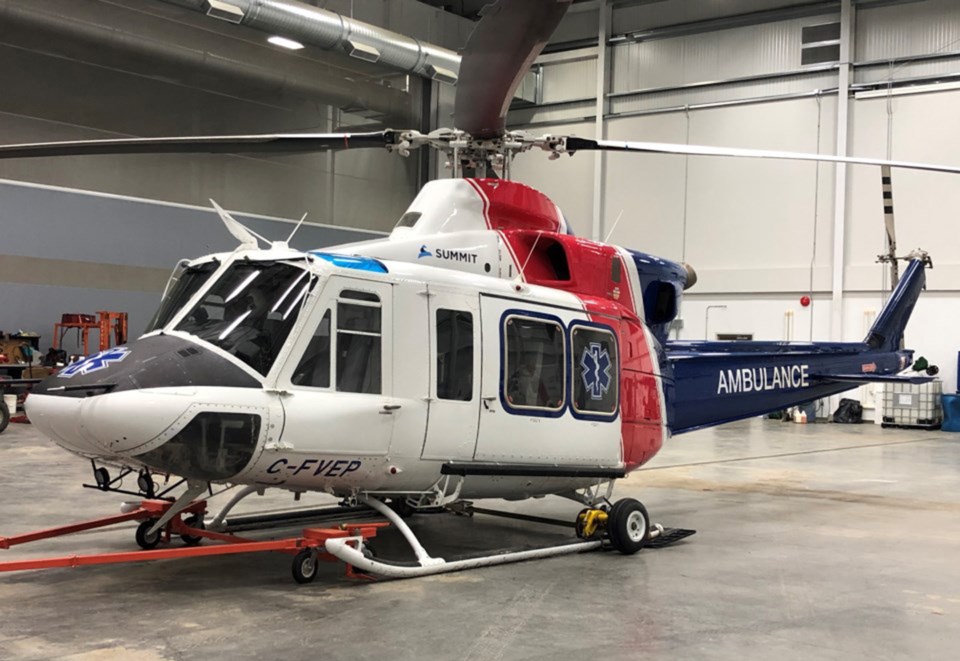A division of the world’s largest helicopter manufacturer is contesting the sa国际传媒 government’s air ambulance contract with a Parksville company.
Airbus Helicopters sa国际传媒 Ltd. filed a petition in sa国际传媒 Supreme Court in November against sa国际传媒 Emergency Health Services (BCEHS), which awarded Ascent Helicopters Ltd. the $544.5-million contract last May. The petition also names Michael Schenkers, procurement manager for the Provincial Health Services Authority (PHSA).
The Fort Erie, Ont.-based arm of the French aerospace giant wants a judge to quash the deal, because it alleges PHSA preferred helicopters made by competitor Leonardo “on the basis of undisclosed criteria.”
"Airbus informed and supported the bids of many of the operators that participated in a competitive procurement process conducted by PHSA to procure Helicopter Emergency Medical Services (HEMS) with several carriers indicating that the H145 was the leading helicopter in their proposals,” said the Airbus petition, filed by Brook Greenberg of the Fasken law firm. “The decision to select the AW169 over the H145 was procedurally unfair, since the PHSA has not provided reasons or rationale for the helicopter decision.”
Schenkers declined comment.
None of the allegations have been proven in court and the province has yet to respond.
In 2021, BCEHS issued a request for proposals (RFP) for rotary wing air ambulance operators to provide air ambulance services under an eight-year contract, with two optional two-year extensions. The contract to transfer critically ill patients between hospitals and respond to emergency medical calls is currently held by Helijet International of Richmond and Summit Helicopters of Kamloops. In the 2022-23 fiscal year, PHSA paid Helijet $18.08 million, Summit $9.42 million and Ascent $4.8 million.
Ascent will become the first Canadian air ambulance operation relying on the Leonardo AW169 when it imports seven helicopters from the Italian company. The contract is expected to start by the end of the year.
Airbus claimed that proponents were required to submit fixed price proposals that are not based on volume of hours actually provided. Airbus also claimed that, prior to making its decision, BCEHS told operators that it preferred the AW169.
“As a result, for example, Ascent submitted a separate proposal with the AW169 late within the RFP process, despite Ascent's lead proposal being for the H145,” said the Airbus filing.
“By preferring a model of helicopter even prior to receiving proposals from the operators, and effectively pre-judging the helicopter decision, BCEHS and PHSA unlawfully fettered their discretion in conducting the RFP.”
Airbus’s filing said that the H145 and similar models have logged more than six million flight hours, including 250,000 flight hours in sa国际传媒. Airbus said there are more than 1,600 of the helicopters in service worldwide, of which 645 fly air ambulance missions.
Airbus boasts more usable cabin space in the H145 and alleged the AW169 requires more scheduled maintenance, which means higher costs.
Under the RFP, BCEHS required bidders to provide two aircraft available at Vancouver International Airport 24 hours a day, seven days a week, one in Prince Rupert available around the clock, one each in Qualicum Beach and Prince George for 12 hours daily and an option to provide one helicopter available for 12 hours a day in Kamloops beginning May 2025. The seventh would be used as a “floater,” when another is grounded for maintenance and repairs.
Airbus’s filing said that more than 7,300 patients are transported either by helicopter or airplane annually in sa国际传媒 Approximately 90 per cent of transports are transfers between hospitals. During 2019-20, Northern Health and Interior Health accounted for 65 per cent of air ambulance transports.


